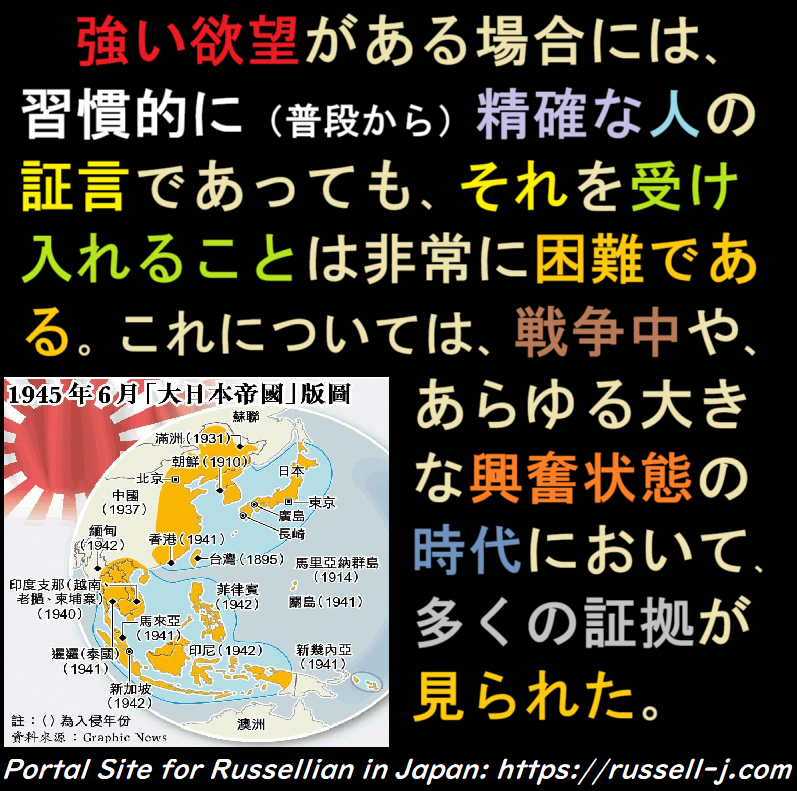
強い欲望がある場合には、習慣的に(普段から)精確な人の証言であっても、それを受け入れることは非常に困難である。これについては、戦争中や、あらゆる大きな興奮状態の時代において、多くの証拠が見られた。
Where strong desires are involved, it is very difficult to accept the testimony even of habitually accurate persons ; of this there was much evidence during the War, and in all times of great excitement.
Source: Religion and Science, 1935, by Bertrand Russell
More info.: https://russell-j.com/beginner/RS1935_05-210.HTM
<寸言>
私たちはみな欲望を持って生きています。適度な欲望は前向きな行動の原動力となりますが、その欲望が強すぎると、事実を事実として受け止める判断力がゆがみます。本来であれば、精確な証言と虚偽の証言とを区別して受け止められるはずですが、強い感情や利害意識があると、その判断が著しく難しくなります。ラッセルは、この傾向は戦争や社会的興奮のなかで特に顕著だと述べています。
この傾向は歴史の中で繰り返し観察されてきました。ChatGPTにそういった具体例を日本と外国に関してあげるように依頼してみました。いろいろな例が挙げられましたが、それぞれ一つずつ、以下、引用しておきます。
1.日本での例
A Brief Comment:
We all live with desires. Moderate desires can serve as a driving force for positive action, but when such desires become too strong, our ability to recognize facts as facts becomes distorted. Under normal circumstances, we should be able to distinguish between accurate testimony and false testimony; however, when strong emotions or vested interests are involved, such judgment becomes markedly difficult. Russell pointed out that this tendency is especially pronounced in times of war or social excitement.
This tendency has been observed repeatedly throughout history. I asked ChatGPT to provide specific examples of this phenomenon in both Japan and abroad. It suggested several, and I quote one example for each below.
1. Example from Japan
War reports during the Pacific War
Even in the later stages of the war, when the Japanese military was in a disadvantageous position, newspapers and radio continued to report “expanding victories” and “numerous enemy ships sunk.” Among the reporters who simply conveyed government announcements, there were those who knew the actual state of the war, but in the climate of strong public desire to believe “we must be winning” and the emphasis on maintaining morale, very few people accepted such testimony.
2. Example from abroad
War situation and propaganda during World War I (European countries) Even when the war situation turned unfavorable, newspapers in various countries continued to stress victory. Accurate reports from the front lines were dismissed as “enemy propaganda” and not accepted. This is precisely the period Russell had in mind.
Source: Religion and Science, 1935, by Bertrand Russell
More info.: https://russell-j.com/beginner/RS1935_05-210.HTM
<寸言>
私たちはみな欲望を持って生きています。適度な欲望は前向きな行動の原動力となりますが、その欲望が強すぎると、事実を事実として受け止める判断力がゆがみます。本来であれば、精確な証言と虚偽の証言とを区別して受け止められるはずですが、強い感情や利害意識があると、その判断が著しく難しくなります。ラッセルは、この傾向は戦争や社会的興奮のなかで特に顕著だと述べています。
この傾向は歴史の中で繰り返し観察されてきました。ChatGPTにそういった具体例を日本と外国に関してあげるように依頼してみました。いろいろな例が挙げられましたが、それぞれ一つずつ、以下、引用しておきます。
1.日本での例
太平洋戦争中の戦況報道2.海外での例
日本軍が劣勢になっていた後半でも、新聞・ラジオは「戦果拡大」「敵艦撃沈多数」などの報道を続けました。政府発表をそのまま伝える記者の中にも、実際の戦況を知る人はいましたが、国民の「勝っているはずだ」という強い願望や士気維持の空気の中で、その証言を受け入れる人はほとんどいませんでした。
第一次世界大戦中の戦況とプロパガンダ(欧州各国)
各国の新聞は戦局が不利になっても勝利を強調。前線からの精確な報告があっても「敵国の謀略情報」だとして受け入れられませんでした。ラッセルはまさにこの時代を念頭に置いています。
A Brief Comment:
We all live with desires. Moderate desires can serve as a driving force for positive action, but when such desires become too strong, our ability to recognize facts as facts becomes distorted. Under normal circumstances, we should be able to distinguish between accurate testimony and false testimony; however, when strong emotions or vested interests are involved, such judgment becomes markedly difficult. Russell pointed out that this tendency is especially pronounced in times of war or social excitement.
This tendency has been observed repeatedly throughout history. I asked ChatGPT to provide specific examples of this phenomenon in both Japan and abroad. It suggested several, and I quote one example for each below.
1. Example from Japan
War reports during the Pacific War
Even in the later stages of the war, when the Japanese military was in a disadvantageous position, newspapers and radio continued to report “expanding victories” and “numerous enemy ships sunk.” Among the reporters who simply conveyed government announcements, there were those who knew the actual state of the war, but in the climate of strong public desire to believe “we must be winning” and the emphasis on maintaining morale, very few people accepted such testimony.
2. Example from abroad
War situation and propaganda during World War I (European countries) Even when the war situation turned unfavorable, newspapers in various countries continued to stress victory. Accurate reports from the front lines were dismissed as “enemy propaganda” and not accepted. This is precisely the period Russell had in mind.